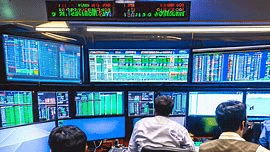
In the world of finance, Tuesday brought challenging times for the Indian equity market. As investors anxiously watched global economic indicators, the Indian market experienced a sharp decline, leaving many concerned about the future.
Major equity benchmark indices, such as the Sensex and Nifty 50, opened in the red, following negative cues from global markets. Asian peers also witnessed a significant drag, creating a weak economic backdrop for the US, China, and the euro zone. This raised concerns of a slowdown in these economies, leading to a cautious approach towards risk sentiment among investors.
The Sensex, the 30-scrip headline index, witnessed a dramatic plunge of nearly 1,000 points, a move that reverberated across the Indian market. Tata Steel and Tata Motors, giants in the Indian corporate landscape, led the slump, adding further pressure to the already volatile market.
The Nifty 50 index, reflecting broader market sentiment, also experienced a considerable drop of 1.46%, tumbling to an intraday low of 19,438.15, while the Sensex lost 982.5 points or 1.48% during the session. This sudden downturn shook investor confidence, causing heightened uncertainty and reflecting in the India VIX, a measure of market volatility, which rallied 15% to 11.79.
Interestingly, this market sell-off comes on the heels of Fitch Ratings’ decision to downgrade the US sovereign credit grade from AAA to AA+. Though this event may have had a minor impact on emerging markets like India, analysts remain optimistic that it is unlikely to pose a major concern for the Indian market in the long term.
However, as with any major market upheaval, certain sectors bore the brunt of the decline. Banking, auto, and metal sectors were among the major contributors to the negative trend. As a result, the Nifty umbrella witnessed all sectoral indices in red, with the Nifty PSU Bank experiencing a significant 3% slide and Nifty Metal following closely.
The Nifty Bank, which reflects the performance of the banking sector, witnessed a decline of nearly 2% during the intraday trade, further amplifying concerns.
Among the companies experiencing notable losses on the Nifty 50 pack were Tata Steel, Tata Motors, Hero MotoCorp, Eicher Motors, and NTPC. On the other hand, Divi’s Laboratories and Nestlé managed to show gains, offering some glimmers of hope amid the widespread sell-off.
Investors and market participants are closely monitoring global economic indicators for potential clues about the direction of the Indian market in the coming days. As economic data from the US, China, and the euro zone continue to impact global market sentiment, Indian investors are navigating through uncertain times.
The recent sell-off in the Indian market can be attributed to a combination of external and domestic factors. Global economic concerns, ranging from China’s regulatory crackdown on technology companies to the resurgence of COVID-19 cases in certain regions, have led to increased caution among investors worldwide.
At the same time, the Indian economy is grappling with its own set of challenges. Inflationary pressures, supply chain disruptions, and the uncertainty surrounding the pace of economic recovery are some of the factors contributing to the volatility in the Indian market.
The banking sector, which is a key pillar of the Indian economy, has been facing headwinds in recent times. Concerns over asset quality, loan restructuring, and the impact of the pandemic on borrowers have weighed on banking stocks, leading to a sell-off in the sector.
Similarly, the auto sector, which plays a crucial role in driving economic growth, is also feeling the brunt of the current market sentiment. Supply chain disruptions, rising input costs, and subdued consumer demand have affected the performance of auto companies, leading to a decline in their stock prices.
The metal sector, known for its cyclical nature, is facing its own set of challenges. While metal prices have witnessed a strong rally in recent times, concerns over the sustainability of the price surge and potential demand-supply imbalances have led to caution among investors.
In such a challenging market environment, investors need to exercise caution and adopt a long-term perspective. Diversification of investment portfolios, thorough research, and a focus on companies with strong fundamentals can help navigate through market turbulence.
While short-term market fluctuations may create anxiety, it is essential to remember that equity markets have historically displayed resilience and the ability to recover from downturns. Investors should focus on their long-term financial goals and stay committed to their investment strategies.
As the global economic landscape evolves, it is prudent to keep a close eye on economic indicators and government policies that could influence market sentiment. Being informed and proactive can help investors make well-informed decisions and seize potential opportunities that arise during market fluctuations.
In conclusion, while the recent sell-off in the Indian market has raised concerns among investors, it is essential to remember that market volatility is an inherent part of investing. By staying informed, adopting a diversified approach, and maintaining a long-term perspective, investors can navigate through challenging market conditions and work towards achieving their financial goals.


Get the latest Crypto & Blockchain News in your inbox.